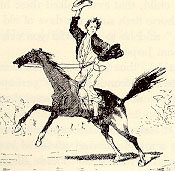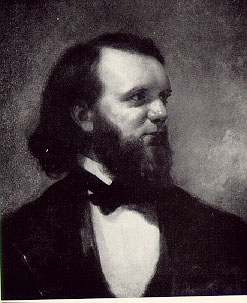

|
The Big Bear of Arkansas |
The character of the mighty hunter is the epitome of the braggart--full of tall tales and self glorification. His hunts are often violent and always exaggerated--wrestling alligators or hunting bees. The most popular mighty hunter is Davy Crockett. Not only a famous frontiersman, politician and fiery orator; Davy was a storyteller and hunter known throughout the country for his bravery, cunning and humor. Crockett's Bear Hunting in Tennessee (1834) is an exemplary tale of what contemporary readers expected of a mighty hunter and of Crockett himself. For Crockett, "one hundred and five bears I had killed in less than one year..." was a plausible claim!
Yet by 1854, when Thomas Bangs Thorpe creates the foremost of all mighty hunters, Jim Doggett, in "The Big Bear of Arkansas", the character of the mighty hunter will transform from a representative of the new American frontiersman into a representative of the diminishing southwestern frontier. The past of unrestrained nature and open land is approaching civilization at full speed when Thorpe's nostalgic attempt to retain a hold on the past is published. Thorpe's mighty hunter retains a sense of dignity as he embodies the past which is quickly slipping away, appealing to contemporary readers as an elegy for the hunter of old who is lost through the advance of civilization and progress in the mid-nineteenth century.
Thorpe's "Big Bear of Arkansas" is the most famous of southwestern sketches published in the the Spirit of the Times. Presumably stemming from life experience, Thorpe brings the reader into an 1830's steamboat on the Mississippi River through the eyes of an educated, well traveled outsider to watch and, more important, listen to an Arkansas frontiersman--the "Big Bar of Arkansas" himself, Jim Doggett. In contrast to other protagonists of Southwestern humor, Jim is described in positive terms as, "...a man enjoying perfect health and contentment; his eyes were as sparkling as diamonds, and good-natured to simplicity. Then his perfect confidence in himself was irresistibly droll." In terms almost Whitmanesque, he is describing an ideal and American man.
The vernacular is realistic and explores this Arkansas backwoodsman's store of practical knowledge and regional humor. Thorpe's language is eloquent and appropriate for the narrator as well as the hunter. After the climax of Jim's story--shooting the bear-- Thorpe develops the complexity of his characterization, saying
Perhaps he had heard of my preparations to hunt him the next day, so he just come in, like Capt. Scott's coon, to save his wind to grunt with in dying; but that ain't likely. My private opinion is, that that bar was an unhuntable bar, and died when his time come.This hunter is not merely a brutish killer, but a man with an intuitive connection to nature that clearly identifies and emphasizes the yearning of the contemporary reader for the world of the "Big Bar of Arkansas."

